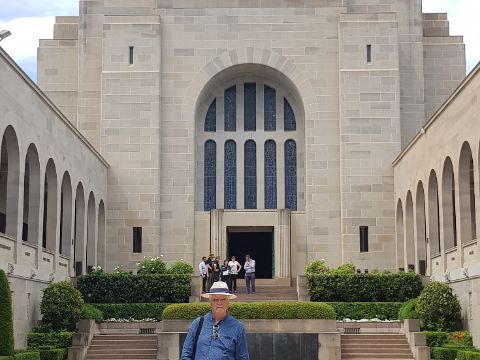- A Charles Sturt University researcher has uncovered the little-known extent and role of Australian Muslims in the Australian armed forces in World War I and World War II
- The research documents how Australian Muslims and non-Muslims fought together for the common cause in both wars
- It adds a new chapter to Australian military history and the understanding of the national fabric composed of minority groups from many different ethnicities, sects, cultures, and languages
A Charles Sturt University scholar has discovered, documented and hopes to publish unique research into the enlistment of Muslim citizens in Australian military forces in World War I and World War II.
Historian Dr Dzavid Haveric (pictured inset above, and below) is an Adjunct Research Fellow in the Charles Sturt Centre for Islamic Studies and Civilisation, a Research Associate at the Melbourne Museum and author of 12 history books.
Dr Haveric said it took four to five years to complete his nation-wide research about Muslims in the Australian military forces in ‘the Great War’ and the Second World War.
“It is the very first documented project in Australian history after my initial article ‘ANZAC Muslims: An Untold Story’ published in 2018 in the Australian Journal of Islamic Studies (Centre for Islamic Studies and Civilisation),” he said.
 The project was supported by Charles Sturt University and the Australian Army History Unit, Department of Defence.
The project was supported by Charles Sturt University and the Australian Army History Unit, Department of Defence.
This research was based on archival sources, relevant websites, newspaper articles, academic journals and literature, archives, and informal remarks in community interactions.
Dr Haveric took field trips to many places across Australia, mostly between 2019 and 2021. He visited local Muslim communities and mosques and met descendants of the Muslim soldiers and representatives of Returned Services Leagues (RSLs).
He held discussions with scholars in related fields, as well as consulting the National Archives of Australia, the Victorian Archives Centre and a number of libraries, including the National Library of Australia, as well as the Australian War Memorial, local war memorials and cemeteries, army museums, and historical societies.
“Evidence collected during my field trips included remarks about Muslim migrants and their descendants serving in the Australian military forces (Australian Defence Forces), their photos, diaries, postcards, letters, booklets, images of plaques and headstones as well as important stories that continue to be handed down from one generation to the next,” Dr Haveric said.
“It is a pioneering project in which I spent a lot of time, energy and dedication.
“After my research, it will be much easier for anyone who wants to do research or document Muslim involvement in ANZACs or Muslims in Australian military forces generally.”
Dr Haveric said he is proud to be the first historian to do this project as part of much broader Australian military history because almost nothing written before that was focused on Australian Muslim soldiers.
The idea for the research began after he found the headstone of a Muslim soldier among a myriad of other graves during his previous research on ‘History of Islam and Muslims in Australia’.
“This headstone symbolically inspired me to move forward with the research and it was a touching moment in my life,” he said.
 “For me as an historian, my Muslim background and my Australianness also helped me to undertake this complex project in an Australian context.”
“For me as an historian, my Muslim background and my Australianness also helped me to undertake this complex project in an Australian context.”
He said the research is expected to be published as the first book on the subject in Australian history.
“Many believe that not a single Muslim took part in the Australian military forces, while others believe there were only a few of them. But my research project shows quite different historical facts and will surprise many scholars and the public,” Dr Haveric said.
“I really hope both Muslim and non-Muslim Australians will be happy about my historical findings, and I believe it is important that Muslims re-discover their forgotten Australian military heritage and share it with non-Muslim Australians.”
He said it was extremely exciting to research and reveal soldiers’ stories and valuable data.
“There are many touching stories, like stories of other Australian soldiers through their loyalty, patriotism and contribution,” he said.
“These Australian Muslims and their descendants who took part in the Australian military forces were minority groups from many different ethnicities, sects, cultures, languages – Asian, European and Middle Eastern descent and background – and were either settled or born in Australia.
“Like Australian military personnel in the past, Australian Muslim personnel also put Australia before all other individual cultural and religious considerations in World War I and World War II.”
The research documents how Australian Muslims and non-Muslims fought together for the common cause. Importantly it notes multi-ethnicity among Australian Muslims in a multicultural context, that is ‘diversity within unity’.
Although it was a hard time for minority groups due to the White Australia Policy, the research reveals all Muslims and their descendants were considered equally in the Australian military forces regardless of their ethnic origins.
It notes the conditions in the frontline battles in which they often took part, dealing with struggles in bloody situations which they faced like their non-Muslim brothers-in-arms.
“We should never forget all those Australians who sacrificed themselves for a much greater cause, including Muslims,” Dr Haveric said.
“Thus, we have to remember Australian Muslims and their descendants who served in the Australian military forces and acknowledge their contribution.”






Social
Explore the world of social